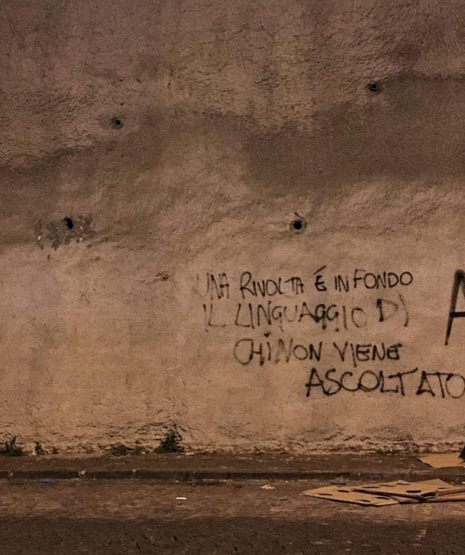Refusing Stockholm Syndrome
Reflecting on Sweden’s approach to COVID-19, Giulia Armiero shares her experience as an Italian living in Sweden.

August 25th: Sweden ranks amongst the top ten countries with the highest death rate per capita in the world. It has more COVID-19 infections and fatalities than all of its Nordic neighbours combined, most likely because, unlike its neighbours who imposed lockdown measures at the height of the pandemic, Sweden has remained lockdown free and driven by
Social Darwinist 'herd immunity' policies.
Flashback to March 20th: the day my father, a 53-year-old with no underlying health problems, was rushed into the Intensive Care Unit at Karolinska Hospital. The day they told
us he had little chance of surviving. The day we had to say our goodbyes over the phone. I would not have had the mental capacity to write this piece if that had, indeed, turned out to be our final goodbye; luckily, he returned home safely after one month in hospital.
The past four months have been ones of healing — physically, but most of all, mentally — from this trauma. Yet, the road to recovery is particularly bitter in a country where people continue business-as-usual: bumping into me at the supermarket, glaring at my mask with disapproving eyes, even failing to respect the government’s social distancing ‘recommendation.’
Unless Swedes have some perverse national death wish, the only justification for this behaviour is that they live under the assumption that herd immunity will work. While death and infection rates seem to have decreased in the past month, can we truly claim herd immunity ‘worked’ when Sweden still ranks amongst the highest death rates per capita in the
world? Any mention of the ‘effectiveness’ of the Swedish strategy is a gross injustice to all those sacrificed for the sake of the economy.
Moreover, it’s hard to miss the eugenicist undertones of herd immunity policies. In an interview with The Times on May 24, as the global death rate reached 340,000, Anders Tegnell, a Swedish epidemiologist, claimed that other countries simply “needed a bit more ice in their stomach” to brace the pandemic. Yet, as global media, as well as the World Health Organisation, began criticising the Swedish method, Tegnell adamantly denied any affiliation to herd immunity.
"there’s one thing distinguishing Italians from Swedes: we do not stay silent"
Sweden, ‘torchbearer of progress and equality,’ accused of eugenics? Unacceptable (despite the forgotten fact that an actual neo-Nazi party, the Swedish Democrats, are the third-largest party in parliament). After months of convincing the world that herd immunity was never on the cards in Sweden, Tegnell’s leaked emails exposed the truth about the Swedish strategy: that losing the elderly and the vulnerable was, indeed, “worth it,” in Tegnell’s own words.
What is most perturbing about the Swedish story is the lack of public outrage. As The Guardian recently argued, Swedes are trapped within an åskitskorridoren (opinion corridor), and anyone who dares to diverge from the herd is branded a “Jew” or an “immigrant,” as a popular Swedish podcast exemplified back in May. Once again, this exposed how Sweden’s COVID-19 discourse is intricately imbued with ethno-nationalist rhetoric.
What adds to my experience is the fact that I am Italian. And Swedes love to remind me of that. When I address the country’s shocking coronavirus response, all Swedes can retort is ‘you’re one to talk, look at Italy.’ Back in April, the Swedish government even went as far as to condemn the Italian media and their criticism of Sweden’s strategy, defaming it as ‘fake news.’
From the fact that there was no mention of Tegnell’s leaked emails in Sweden’s leading newspaper Dagens Nyheter, to the doctor telling my father he must have contracted the virus
in Italy (when we went back in November, despite him getting sick in March), to the impossibility of buying masks anywhere in Stockholm, Swedes do not need ‘MAGA’ hats to prove their ardent loyalty to the government. This stands in stark contrast to the Italian experience. When Italians find out we live in Sweden, their immediate reaction is: “You must
have it really good up there, don’t you? Nothing like the misery down here!” Indeed, we do. There is no denying Sweden is more socially progressive than Italy. Nevertheless, the fact that Swedes “have it so good” has its disadvantage: they have lost all ability to criticise the status quo.
If anything, there’s one thing distinguishing Italians from Swedes: we do not stay silent. The walls of Naples, my hometown, burst with graffiti. It seems that they shout their opinions at you. By contrast, Stockholm buildings are bare: symbolic of a hyper (self-) disciplined society.
Stockholm street artists even have a designated place, an old factory in the barren suburbs nicknamed ‘Snösätragrund Hall of Fame,’ that they are allowed to use. In other words, graffiti has been stripped of all its rebellious purpose. Yet Swedes seem unfazed by this governmental control — I was in fact introduced to this factory by a Swedish left-wing activist.
As he proudly pointed to the murals around us, all I could notice was the absence of any political message on the walls. Unsurprisingly, there was no mention of the 5800 sacrificed
by their government.
The graffiti factory exemplifies how Swedes’ complacency towards Tegnell’s controversial policies is emblematic of a much wider phenomenon. After seven years of living in Sweden and consistently being met with this intense reluctance to criticise the status quo, I’m left believing that the entire country suffers from Stockholm Syndrome: blind faith in a government that is putting their own lives at risk.
 News / University Council rescinds University Centre membership20 February 2026
News / University Council rescinds University Centre membership20 February 2026 News / Hundreds of Cambridge academics demand vote on fate of vet course20 February 2026
News / Hundreds of Cambridge academics demand vote on fate of vet course20 February 2026 News / Judge Business School advisor resigns over Epstein and Andrew links18 February 2026
News / Judge Business School advisor resigns over Epstein and Andrew links18 February 2026 News / Union cancels event with Sri Lankan politician after Tamil societies express ‘profound outrage’20 February 2026
News / Union cancels event with Sri Lankan politician after Tamil societies express ‘profound outrage’20 February 2026 News / Caius students fail to pass Pride flag proposal20 February 2026
News / Caius students fail to pass Pride flag proposal20 February 2026










